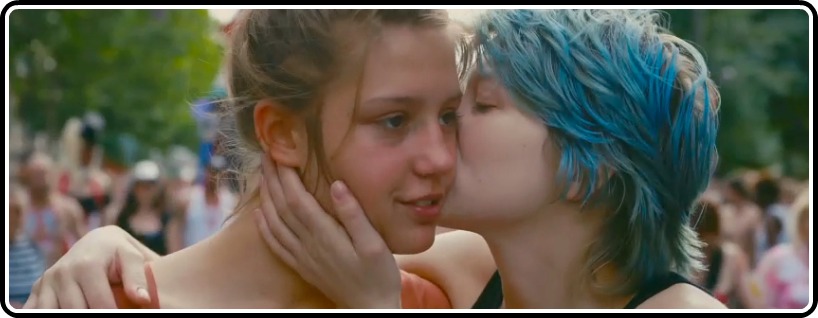After taking this year’s Cannes Film Festival by absolute storm, not only becoming a lightning rod of controversy (a rod that is still attracting “think pieces” and various other attempts and dumbly devolving the conversation around this film into its sex scenes and its rating) but a bit of history changing, with its Palme d’Or victory being shared by the film’s two lead actresses Lea Seydoux and Adele Exarchopoulos and also its director, Abdellatif Kechiche. Becoming described as, by those who have no interest in either looking into the actual film or anything outside of a blog hit, “that French lesbian romance drama,” Blue Is The Warmest Color is not only far greater than any of the bullshit controversy (that I shan’t mention a single time outside of this first paragraph) that it has courted, but it also stands as one of the most emotionally resonant and profound looks at love, in all of its forms, we have seen in years.
Based on the French graphic novel Blue Angel from writer Julie Maroh, the film has been making the rounds in limited release since mid-late October, and after a lengthy festival run finding the film jumping from Cannes to Telluride, this masterpiece from director Kechiche may prove to be one of 2013’s greatest, and most unforgettable, pictures. We’re introduced to a young, 15-year-old girl named Adele (Exarchopoulos), as she attempts to not only make her way through school, but also try to find a place in this world. With aspirations of becoming a teacher, she meets a woman named Emma, and her life is forever changed. The blue-haired woman, seemingly birthed out of a late night dream had by Adele, sparks a relationship with her, only to find both of them becoming more and more enraptured by the other. A tale of a love affair from the beginning, the middle and possibly its very end, the film is definitively an “epic,” at least in its runtime, and arguably in the emotional depths that it so perfectly delves into.
As with any film of this nature, much, if not all of the picture’s success lays on the shoulders of those that make up the central cast. And thankfully, with regards to this film, the picture receives two of the year’s crowning acting achievements. Exarchopoulos stars here as the film’s central character, Adele, and is asked to do much of the film’s emotional heavy lifting. A part of nearly every single moment here, her sequences alone are deeply moving and unforgettable, but it is when Seydoux arrives on the screen as Emma, and the two begin sharing their character’s lives together, that the film comes absolutely alive. With both actresses feeling completely feeled in with regards to their characters, everything from the chemistry the two share to the way that someone like Seydoux uses something as simple as a glance to tell so much adds an immense depth to an already powerful picture. Seydoux does seem to steal the show here, with such a breathless sense of truth to every moment from her introduction to the film’s final sequence, holding enough emotion in everything from her conversations opposite her co-star to something as simple as the above mentioned glances, particularly in a dinner sequence during the film’s finale. It’s such a tactile and palpable performance, both truly are, that the film becomes an emotionally devastating and truly impossible to forget bit of emotional drama.
Just a few years after his last film, Black Venus, Kechiche is back and back with what is likely his best work to date. Visually, the film is brazenly intimate, getting some gorgeous cinematography from Sofian El Fani, and finds Kechiche perfectly comfortable in understanding that the performances drive this picture. Very much similar to Kechiche’s previous works, the film is chock full of lengthy shots, often times lingering on a character’s face or a conversation, giving the film a fly-on-the-wall aesthetic that only adds to the drama. Yes, the sex scenes here are explicit, but only for those looking to describe them as such, as anyone interested in diving deeper into the film will realize that they are not only extremely beautiful and, yes, in many ways truly erotic, but again, that’s entirely due to Kechiche’s understanding (and also the performances from his actresses) on how to use these sequences to further a narrative of two lovers feeling each other out, and falling deeper and deeper in love.
Beautifully entrancing and bewilderingly emotional, this astounding and deep look into love in every single one of its many stages is not only a film greater than the controversy you’ve likely read non-stop about, but it’s as powerful a look at romance as we’ve seen in a handful of years. Wonderfully profound and brimming with honesty and truth about relationships, the film uses an intimate aesthetic and two star making performances to paint a picture so beautifully crafted that it needs to be seen to be believed.




